USgamer Answers: Are There Too Many Video Game Remasters?
There a whole lot of video game remasters heading our way. Is this growing trend a good thing or a bad thing?
This article first appeared on USgamer, a partner publication of VG247. Some content, such as this article, has been migrated to VG247 for posterity after USgamer's closure - but it has not been edited or further vetted by the VG247 team.
Re-releases of games litter our release schedules these days. Towards the end of the previous console generation, publishers began to experiment with remastered games: re-releases that take an original title or series, improve the presentation, and re-launch in a clear, concise package. It's a good way for older titles to pick up new players; if you missed previous installments, here they are for your enjoyment! They also allow classic fans to revisit their favorite games on a new platform.
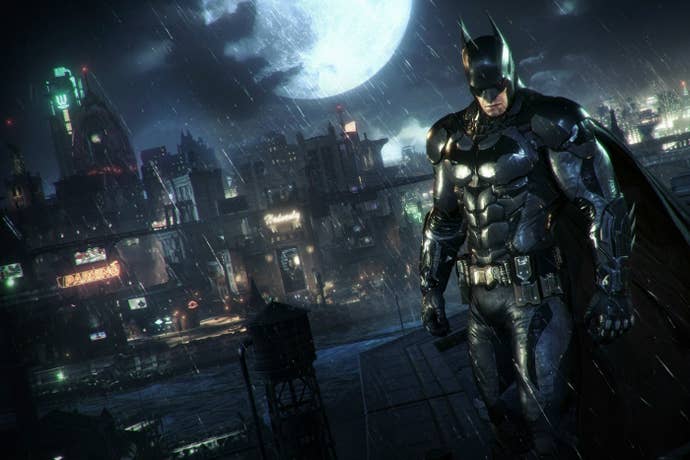
The problem is it feels like remastered games are everywhere in the eighth console generation. X HD, X Remastered, X: Definitive Edition, The X Collection; all different names to signify this new trend.
The PlayStation 4 and Xbox One are playing host to a number of revisited titles. Last week, Jeremy reviewed Final Fantasy Type-0 HD. Nearly two weeks ago, Mike reviewed DmC: Definitive Edition and Kat weighed in on Homeworld Remastered. On April 7, just a year out from the original release, Dark Souls II: Scholar of the First Sin presents a version of the game with an upgraded presentation, enemy tweaks, and additional story. Devil May Cry 4: Special Edition brings back the 2008 action title with 1080p visuals and a few additional playable characters. We're also hearing rumors that Warner Bros will release Batman: Arkham Asylum and Batman: Arkham City as a remastered package later this year.
For some, it's a boon. For others, it's shining a light on a lack of new games for the PlayStation 4 and Xbox One. The team here at USgamer decided to weigh in on the various remasters already on store shelves and still heading our way.
Jaz Rignall, Editor-at-Large
Let's face it, we've been buying remastered movies for years. Indeed, Criterion made a killing by being one of the definitive "remastering" companies - and I bought a ton of their product. What they did was pick really interesting movies, and then spent months lovingly restoring them so that when you watched them again, they almost felt like something new. The producers also researched relevant material, and would include that on the disc - perhaps even going so far as to add theatrical and director's cuts in the same box so you could watch them both and compare. Of course, there were plenty of other things too - like audio commentary from actors and directors, and documentaries, makings-of, theatrical trailers and whatever other treasures they could find.
So why should games be any different? To me, it's all about the extras - just like it is when you buy a really good definitive edition of a movie. Firstly, I don't want some cheap-ass, up-rezzed version of the original. If I'm paying premium price for a game - or even a decent one - I do expect the developer to have gone in and expertly upgraded the graphics so they look sharper and better than they ever did before, and don't feel like they've quickly been run through some kind of automatic filtering process. Neat touches like using the new platform's light filtering and effects to further enhance the graphics is of course important too. That's what helps give the game a "new gen" look.
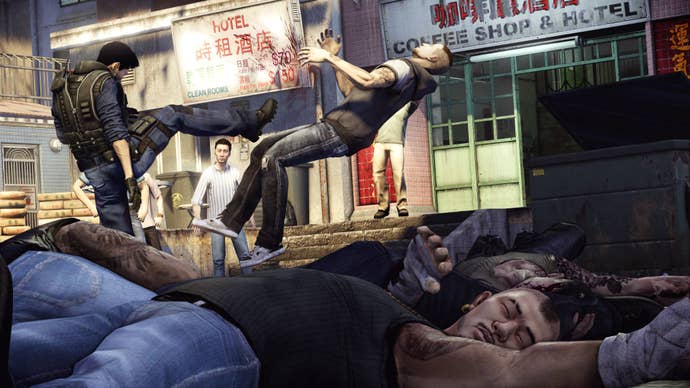
"Let's face it, we've been buying remastered movies for years. So why should games be any different?"
If there's DLC for the original version, I want it all as part of the package. And most importantly of all, I want to see some effort put into re-polishing the gameplay if necessary, smoothing off any prior rough edges and generally giving it a buff so it feels sharp and new. That to me is the minimum requirement to make a good premium remastered game. Anything less than that, and it should be a bargain bin special.
Ultimately, I'm a big fan of remastered games. When done well, they should give you the opportunity to play a better-looking, more polished version of the original - either enjoying it for the second time, or seeing it for the very first time as something new. There are plenty of games out there that are good candidates for remastering, but my most-wanted is Red Dead Redemption. That game already looks stunning on PS3, and I can imagine with a good amount of work put into the graphics and all the original DLC, that would make for one seriously good remastered game - especially when you consider how GTA V looks on new generation consoles. Surely it's a no-brainer?
Mike Williams, Associate Editor
I'll be honest. If they're done well and at the right price point? I love remasters. If publishers want to give me a great game with all of the DLC, higher resolution, and some additional content I'm not going to argue. I've gladly double-dipped on new releases of the same game, so why would I balk at improved versions? There are even games I was interested in the first time around that I picked up remastered edition for.
There are classic titles that probably won't get a brand-new sequel in this day and age, but a spit-shine would do a world of difference. Who doesn't have a list of titles they wish would get a solid remaster? Off the top of my head, I'd like remasters for the under-appreciated Splinter Cell: Blacklist, the Dead Space franchise, real ports of the Prince of Persia franchise, all three Shadow Hearts games, every portable Castlevania, Seiken Densetsu 2 & 3, the early Front Mission games… You get the idea.
Publishers still have to check off those boxes though. When I said, "done well", I meant it. Don't just throw the game out there with the same bugs and issues that plagued the original release. And actually test your release for new bugs! Ubisoft's release of the Prince of Persia Trilogy HD up-rezzed the three Prince of Persia games to 720p, but added a host of freezing issues and sound problems. The Splinter Cell Trilogy HD wasn't much better. Square Enix has the gall to release the PC version of Final Fantasy on PlayStation 4 as-is. Examples like these are games just thrown out there to die, taking poorly-ported PC versions and moving them to new platforms. Players can tell when a remaster is simply a cash-grab, without an understanding of what made the original product great in the first place.
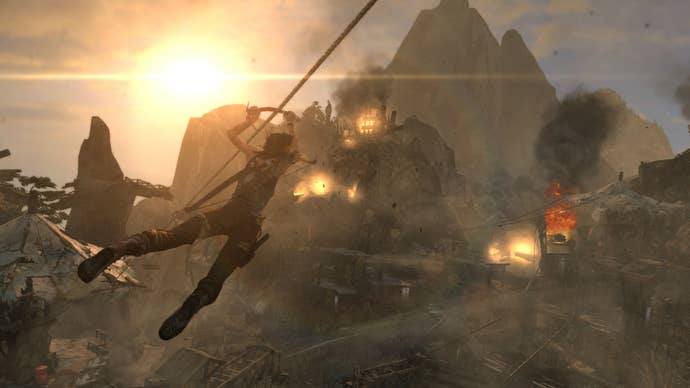
"Who doesn't have a list of titles they wish would get a solid remaster?"
Price point is also rather important and something publishers are still coming to terms with. When Square Enix released the excellent Definitive Editions of Tomb Raider and Sleeping Dogs, they priced them at $40. From a publisher's standpoint I can see that being a solid asking price, $20 below a competing new title. The problem is those games could be purchased in their non-Definitive versions for $10-15. I personally lean towards $30 being the sweet spot in pricing, but I acknowledge that remastering a old game well does require development effort (read: money) and the general reticence to race to the bottom in pricing. Pricing is still an area that needs work, especially with games that are only 1 or 2 years out from their original release.
All this is a long-winded way to say, "Yay, good remasters!" Are remasters a replacement for making new games? Of course not, but they give existing teams a chance to learn some new tricks with new hardware before moving on to new games. I'm certain Crystal Dynamics stepped away from Tomb Raider: Definitive Edition with expertise that will help them with Rise of the Tomb Raider. Naughty Dog's work on The Last of Us: Remastered Edition will probably inform their efforts on Uncharted 4. I know this partially because I did an entire feature on HD remasters, but also because it's simply common sense. So here's to more great HD remasters in our future.
Jeremy Parish, Editor-in-Chief
So you're saying remasters are like an insurance policy. We pay a developer another $60 for an old game we've already bought for $60 so that the $60 we spend on their next one won't be wasted. Interesting, interesting. Really puts the burden on the consumer, though...
I'm of two minds about remasters. Something like Final Fantasy Type 0 HD? That kind is totally welcome, because it exists for the purpose of bringing games to a new audience; because the original game launched in Japan on PSP after that platform had gone moribund here in the States, we'd never have played Type 0 at all without the remaster. That was a project in which the director of the game found a means to answer international fan demand, and it feels like a service. Or Metal Gear Solid HD Collection, which brought a ton of classic games together on platforms where they'd never appeared before. That amounted to a great value, and a great idea. Even The Last of Us Remastered, where the original game flopped somewhat due to last-gen fatigue and the remaster felt like a Game of the Year Edition? I'm on board with that, sure.
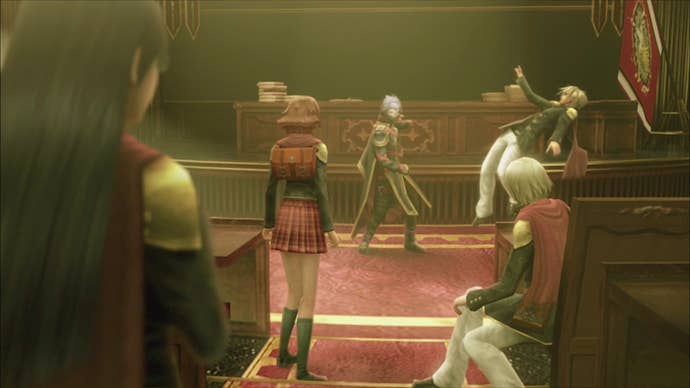
"We'd never have played Type 0 at all without the remaster."
But something like the Batman: Arkham games? Arkham City is only four years old, and we've already seen the Game of the Year Edition and its classy-ass cover. If you would like to play Arkham City or Arkham Asylum, you can buy the pair at GameStop for about $25 and they run perfectly well on PlayStation 3 or Xbox 360. Reprising them so soon feels like a naked money-grab, and not even a sensible one. Why on earth are they releasing the remasters after Arkham Knight? I could almost understand it if the idea was to function as a lead-in to the next game, but coming six months after the next game? Who's being served here? Warner Bros. shareholders, maybe. But that's about it.
And yet, I find myself drawn a bit to the Arkham remaster, because those two games have been on my backlog for ages. I enjoyed Arkham Origins when I reviewed it in 2013, and I really want to go back and see how that franchise has evolved. But that's the thing! Those games are already on my backlog. I already own them. I'd love to be able to pop them into my PS4 or Xbox One and catch up sometime… but I can't, because those systems were built to abandon backward compatibility — the first console generation this millennium not to provide at least a partial upgrade path. So in order to play them, I have to find space in my crowded console setup to get my retired consoles up and running again, which is a giant pain in my butt and not really worth the trouble.
The idea behind ditching backward compatibility, supposedly, was to cut the cost of the consoles. Well, here's the hidden cost: Your PS4 only cost $300, but now you have to re-purchase any game you would like to play again. Yes, the framerate and resolution will (probably) be better, and you'll get to enjoy more bloom lighting and self-shadowing polygonal models, but is that really worth the price of a new, full-priced retail release? Especially for those of us with these old games collecting dust somewhere already? The leap from last generation to this one is the most modest perceptual jump consoles have ever taken to begin with, which makes the need to pony up another chunk of cash feel doubly bitter. If PS3 to PS4 were a light-speed advance like, say, PS1 to PS2 or PS2 to PS3, yeah! Remasters would be great.
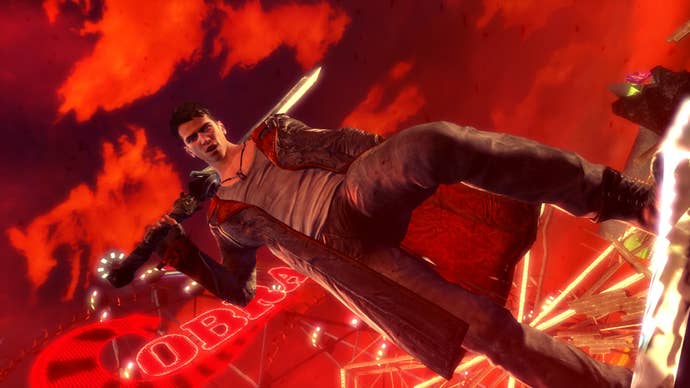
"Yes, the framerate and resolution will be better, but is that really worth the price of a new, full-priced retail release?"
Taken on its own, I suppose this trend wouldn't be so upsetting. But taken in conjunction with all the other nickel-and-dime behaviors game publishers have been exhibiting since the "recession-proof" industry's bottom line took a dirt nap at the end of the last decade, it's just another brush stroke in a portrait of an exploitative, anti-consumerist industry that increasingly exists to bilk and abuse its core user base. Sometimes I feel that the console industry in particular has become incredibly vile from a trust-and-faith perspective, happily abandoning pretty much any pretense of integrity in favor of naked, rapacious greed.
And hey, we're all capitalists, here. If the market will bear it, video game peddlers have every legal right to strip-mine their consumers of every penny they possess. And if consumers are OK with that, they deserve to get fleeced. But increasingly, crass maneuvers like all these superfluous remasters speak of an entire industry propped up on an untenable business model: Beholden to expensive blockbusters and forced to spend the off-season with begging cup in hand to help keep those lavish, barely profitable exercises in excess from driving them out of business. And increasingly, I'm of a mind to let it all come crashing down and hope something better emerges from the smoking wreck. That's capitalism, too.
I've been a dedicated console and handheld gamer for the past 30-odd years, but I have to admit the PC market, where a sensible, creative, and vastly less rapacious corner of the industry thrives… it's looking pretty good these days.
Kat Bailey, Senior Editor
I'm of two minds when it comes to Remastered Editions.
In the shoes of the average gamer, I would probably welcome the opportunity to revisit some games I never got around to last generation. I still have my PlayStation 3 and Xbox 360, but let's be honest, both consoles are looking a little long in the tooth these days. I had a friend tell me last night that he doesn't like to turn on his PS3 if he can help it. I generally agree.

In that vein, it's nice to have access to games like Dark Souls II, Last of Us, and Grand Theft Auto V on the PlayStation 4 — games that I never got around to play in the previous generation (look, I've got a lot of games to play, alright?) They fill a gap in my library, and I can't think of many games that don't look better running at 60 FPS in 1080p. I speak as a person who owns Diablo III on both PlayStation 3 and PlayStation 4 — there is a big difference.
"I don't mind all the Remastered Editions per se, but the rush to double-dip is starting to get a little comical."
I said that I'm of two minds, though, and the reason is that I sort of see the Remastered Editions as a crutch. The more games get remastered, the harder it is to ignore the glaringly obvious content gaps on the PlayStation 4 and Xbox One. There have been solid games on both platforms — Bloodborne being easily the best of them — but the past two holiday seasons have been largely disappointing. With the flow of new games still at a relative trickle, the Remastered Editions feel like a bit of a cop-out.
Or put another way: Can we please get this generation of games going, please? The previous generation was two years too long to begin with.
Anyway, I don't mind all the Remastered Editions per se, but the rush to double-dip is starting to get a little comical. Here's hoping that this is the last that publishers have to rely on games from previous generations to fill the gaps on their schedules.
Bob Mackey, Senior Writer
Back in my day, buying the "HD remake" (or whatever) of an already HD console game was just called "getting the PC version." And that's kind of what this recent wave of re-releases feels like to me--except without the nice discounts that come with purchasing slightly old games on Steam. Each of the Arkham games, for instance, regularly dip as low as five dollars--that's how much I grabbed Origins for, anyway--yet I can only assume the upcoming collection will have a $59.99 price tag attached. Now, don't get me wrong: That's not bad at all for the sheer amount of content this trilogy offers. Still, you can't ignore the fact that the value of games takes a complete free-fall once they've been out for six months. That's just the economy we're working with, here.
Putting aside the issue of price, though, there are cases where these HD collections can be worthwhile. Jeremy mentioned the Metal Gear Solid HD Collection--one of my favorites--but I'll also bring up the Ico and Shadow of the Colossus HD bundle, simply for how much it improved the latter half of that pairing--Shadow was amazing before the remake treatment, but the boost it received in visual fidelity actually makes a huge difference. I'll even give credit to the upcoming Dark Souls 2 collection, simply because it's doing all it can to justify its existence--a testament to FromSoftware's passion, if anything. If you pick up this version of the game, the core campaign actually plays out like The Legend of Zelda's second quest: a remixed version designed to confound those who mastered the original experience. Hell, I'd even go for a Dark Souls 1 HD remake, if only because it's always been a bit hampered by performance problems--discounting the fan-made patch for the PC version.
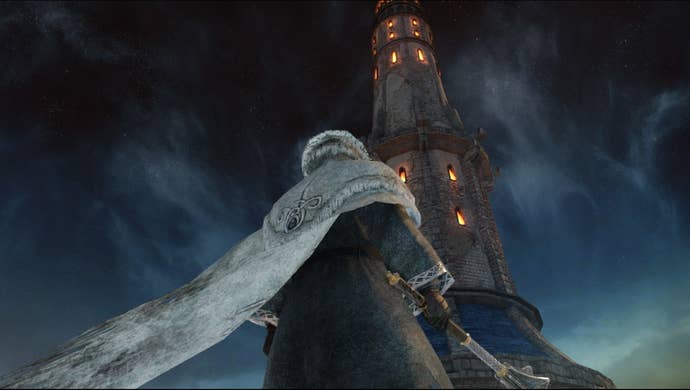
"To be honest, I'd prefer if these HD bundles didn't prioritize games everyone already owns."
To be honest, I'd prefer if these HD bundles didn't prioritize games everyone already owns. That's why I dug last December's Ace Attorney Trilogy so much: I'd long since let those games slip through my fingers, so it's great to have all of them permanently installed on my 3DS. And Final Fantasy Type-0 is definitely a great example of the HD treatment giving older games a new life: I've been interested for years, and now I can own it in the only form it can possibly exist--as much as I'd love a Vita port. These remake bundles can do a lot for games in terms of preservation, so long as publishers put the right resources into them--the less said about the Silent Hill HD Collection, the better. Even if most of these bundles feature games easily spotted in your average GameStop bargain bin, I'll gladly tolerate those if we can occasionally get something more in need of bundling.
